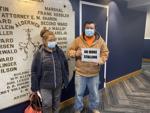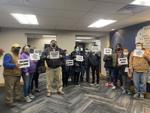Members of Quad Cities Interfaith held signs at Wednesday's Davenport City Council meeting with messages stating "No more stalling" and "We need relief now."
The group of roughly 10 immigrant workers urged Davenport aldermen to provide pandemic relief funds for undocumented workers excluded from federal stimulus checks. The group made a similar request last week of the Scott County Board of Supervisors to assist low-wage essential workers excluded from previous relief programs.

Davenport Mayor Mike Matson (right) visits with members of the Quad Cities Interfaith following the Davenport City Council meeting on Wednesday, Feb. 9, 2022. The group urged Davenport aldermen to provide pandemic relief funds to assist low-wage essential workers, including immigrant workers, excluded from previous relief programs.
While millions of Americans received stimulus checks during the pandemic, thousands of immigrant workers in Iowa did not, according to the group.
Based on U.S. Census Bureau data, Quad Cities Interfaith estimates at least 1,700 essential workers within Davenport were excluded from stimulus checks, child care payments, hazard pay and unemployment insurance.
"As essential workers, we risk our health and safety every day to keep society running and to make sure everyone receives the things they need to survive — like food, shelter, education, transportation and health care," the group wrote in a letter delivered to the Davenport City Council. "But in the last two years, too many value-producing front-line workers have been excluded from" federal assistance, slowing down economic recovery.
People are also reading…
Among those front-line workers excluded from stimulus checks is Davenport resident Gilberto Torres. Torres, who works in construction, contracted COVID-19 but was told to keep going to work.
"For four weeks I was sick to the point where I couldn't even get out of bed," he said during the meeting, speaking in Spanish with an interpreter. "Even though my health was compromised, I still managed to make it out."

Gilberto Torres and Laura Monica Castel of Davenport hold signs Wednesday, Feb. 9, 2022, at the Davenport City Council meeting with messages stating "No more stalling" and "We need relief now." The pair were part of a group that urged Davenport aldermen to provide pandemic relief funds to assist low-wage essential workers, including immigrant workers, excluded from previous relief programs.
Laura Monica Castel of Davenport works as a house cleaner. She said she got COVID-19 and had to be hospitalized. Once out of the hospital, while not still fully recovered, she went back to work in order to pay rent and bills.
Emil Santiago, who lives in Rock Island and works in Bettendorf, stressed many people working jobs deemed essential during the COVID-19 pandemic have varying immigration statuses. And while they may not be U.S. citizens, they still suffer financially, emotionally and physically from the pandemic.
"I pay taxes like any American citizen ... but was excluded and not eligible to receive the federal pandemic relief stimulus checks," despite working in person throughout the entire pandemic, Santiago said in Spanish through an interpreter.
The group requested Davenport aldermen allocate $11 million in COVID-19 relief money to provide assistance to workers who were ineligible for previous relief programs, including undocumented workers.

Members of the Quad Cities Interfaith hold signs Wednesday, Feb. 9, 2022, at the Davenport City Council meeting with messages stating "No more stalling" and "We need relief now." The group urged Davenport aldermen to provide pandemic relief funds to assist low-wage essential workers, including immigrant workers, excluded from previous relief programs.
Of those funds, the groups requested $5.5 million in direct cash assistance in the form of stimulus checks in the amount of $3,200 for every low-wage worker in Davenport excluded from previous rounds of pandemic relief. The group also requested $5.5 million in funding to local businesses to provide premium pay to essential workers making less than $75,000 per individual.
Quad Cities Interfaith claims the $11 million investment would produce $13.2 million in economic stimulus to the local economy, plus $704,000 in sales tax revenue, based on analysis by the Economic Policy Institute and Common Good Iowa.
Since last year, essential and excluded immigrant workers have been organizing into core teams at their Hispanic Catholic parishes in Iowa City, West Liberty, Muscatine, Columbus Junction and Washington. The teams formed a new regional organization called Escucha Mi Voz, a spin-off of the Iowa City Catholic Worker. LULAC and Catholic Worker House of Iowa City, a nonprofit that houses undocumented immigrants, are two of the 16 groups that lobbied for the Excluded Workers Fund.
Iowa City and Johnson County have contributed $1.5 million to $2 million to such a fund. And other states, like California and New York, have passed similar measures that allow workers excluded from federal funds to receive direct payments from the state and municipalities.
No decision on the group's request has been made by either Davenport aldermen or the Scott County Board of Supervisors.
The Davenport City Council adopted a spending plan in July of last year outlining strategic projects and priorities to be funded by the nearly $41 million in ARPA funds awarded to the city. The plan includes funding for transitional housing, neighborhood revitalization, youth and family support, flood mitigation, violence intervention and prevention, sewer connectivity, and library and park enhancements.
"I listened and certainly understand the issue, but from a standpoint from the city's perspective last summer we sat down and compiled a list of 58 different options and projects," Alderwoman Marion Meginnis, Ward 3, said after the meeting.
"We ranked those and picked what we thought were the most important ones. And I don't see us changing that at this point," said Meginnis, whose ward includes some of the poorest areas of the city. "This council voted for project-based things, and I don't see that changing."
Meginnis said she was "pleased with the list of the people" who would benefit from the list of city projects funded by federal COVID-19 rescue dollars, noting much of the investment would be targeted to low- to moderate-income census tracts.
Davenport Mayor Mike Matson thanked the group after the meeting for sharing their comments with city officials.
Matson did not immediately return a message Thursday morning seeking further comment on the group's request.
-- Dave Hotel of the Muscatine Journal contributed to this article
"direct" - Google News
February 11, 2022 at 03:45AM
https://ift.tt/Dg9A5w8
Excluded essential workers urge Davenport, Scott County direct pandemic money their way - Quad City Times
"direct" - Google News
https://ift.tt/dEp2Ja9
https://ift.tt/EFBY270
Direct
Bagikan Berita Ini














0 Response to "Excluded essential workers urge Davenport, Scott County direct pandemic money their way - Quad City Times"
Post a Comment